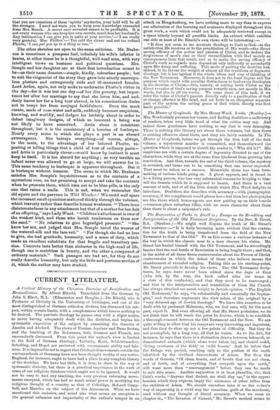CURRENT LITERATURE.
A Critical History of the Christian Doctrine of Justification and Beconciliaticra. By Albert Ritschl. Translated from the German by John S. Black, M.A. (Edmonston and Douglas.)—Dr. Ritschl, who is Professor of Divinity in the University of Gottingen, and one of the most distinguished of German orthodox divines, has discussed his sub- ject, within certain limits, with a completeness which leaves nothing to be desired. The patristic theology he passes over with a slight notice, as never having adequately dealt with the doctrine, and begins his systematic exposition of the subject by examining the theories of Anselm and Abelard. The views of Thomas Aquinas and Duns Scotus, and the teaching of the Reformers, both German and French, are successively dismissed. From this point the author's view is limited to the field of German theology; Leibnitz, Kant, Schloiermacher, .Schelling, and Hegel are reviewed with consummate ability and fair- ness. It is impossible not to regret that theological movements outside the -various schools of Germany have not been thought worthy of any notice. England, for instance, ought to have had a place in any complete history of the doctrine. We have but little, it is true, to show in the way of systematic divinity, but there is a practical importance in the work of some of our religious thinkers which ought not to be ignored. It would not be easy to find any teaching, the very greatest reforming move- ments excepted, which has had so much actual power in modifying the religious thought of a country as that of Coleridge, McLeod Camp- bell, and Maurice on the subject of the Atonement. When we have mentioned this omission, and noted also what seems an exception to the general calmness and impartiality of the author's temper in an attack on Ilengstenberg, we have nothing more to say than to express our admiration of the learning and acuteness displayed throughout this
great work, a work which could not be adequately reviewed except in a space utterly beyond all possible limits. An extract which exhibits one side at least of Dr. Ritschl's own views will be interesting :—
" It does not seem to me accurate theology to limit to God—to the satisfaction He receives or to the propitiation of His wrath—the direct saving efficacy of the action and passion of Christ, and to deduce the forgiveness of men's sins or their reconciliation with God merely as consequences from that result, and so to make the saving efficacy of Christ's work as regards man dependent only indirectly or secondarily upon His doing and suffering. This mode of putting the doctrine has, indeed, in its favour the weight of almost all the traditions of dogmatic theology, but it has against it the whole idiom and way of thinking of the New Testament. Moreover, it does not in the least degree suit the purpose which ought with peculiar distinctness to lead every theologian in his doctrine of Christ,—this, namely, of setting forth Christ as the direct revealer of God's saving purpose towards men, not merely in His words, but also in all his works. We come short of this task, if we refer the value of Christ's passion directly only to a pacification of God or change effected in His mind, and set forth in an altogether separate part of the system the saving grace of God which thereby was first made possible."






































 Previous page
Previous page